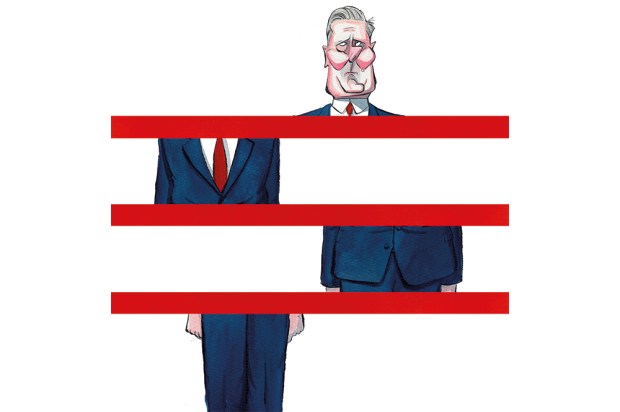Is it a crime to mock a criminal’s unfortunate hairstyle? Police in South Wales seem to think so.
Last week, Gwent Police posted on Facebook calling for any information on the whereabouts of 21-year-old Jermaine Taylor, a convicted drug dealer from Newport who had breached his license conditions.
They put up the obligatory mugshot, in which Taylor sports his one-of-a-kind do – completely bald on top, two vertical, wispy columns of hair in the back. Facebook users proceeded to rinse him for all he was worth, with thousands of jokes, memes and puns.

‘Who done his hair? Moses?’, said one user, nodding to Taylor’s Red Sea-style parting. ‘Barber: “What you after bro?” Jermaine: “You know Joleon Lescott?” Barber: “Say no more fam”’, said another. Another joked that ‘police are combing the area’.
But Gwent Police didn’t see the funny side. A day later they put out a statement underneath the original post, effectively warning users that mocking Taylor’s hairline could constitute a criminal offence:
‘Please remember that harassing, threatening and abusing people on social media can be against the law’, they thundered. ‘If you say something about someone which is grossly offensive or is of an indecent, obscene or menacing character, then you could be investigated by the police.’
It was a ludicrous – not to mention authoritarian – response. And if their aim was to stop the thread being hijacked by pisstakers, it backfired badly.
The police soon became the target of derision. At time of writing, the post has been shared over 15,000 times and attracted almost 90,000 comments from amused members of the public, either mocking Taylor for his trim or mocking the police for taking offence on his behalf.
We could dismiss this as a mad one-off. Not all constabularies are as po-faced: in 2015, West Midlands Police likened a burglary suspect to Sloth from The Goonies. Mugshots and bad e-fits are often ridiculed by social-media users without coppers feeling the need to threaten them with arrest.
But the Jermaine Taylor case is only the most risible example yet of the state showing an unhealthy interest in policing ‘offensive’ content on social media.
A Times investigation in 2017 found that nine people a day were being arrested for posting allegedly offensive messages online. These offences fall under Section 127 of the Communications Act 2003, which criminalises the sending of messages or material that are ‘grossly offensive or of an indecent, obscene or menacing character’.
This particular line is quoted in Gwent Police’s ridiculous post. And though it is unlikely anyone will get their collar felt for having a joke at Jermaine Taylor’s expense – South Wales’ finest certainly can’t arrest all of them – there are plenty of cases in which people have been prosecuted for harmless jokes, comments and posts.
Perhaps the most high-profile Section 127 case is that of Paul Chambers. He was arrested in 2010 after he joked on Twitter about blowing up Robin Hood Airport in South Yorkshire (it had cancelled flights due to cold weather). His case drew high-level support from the great and good and he managed to appeal his conviction.
But others haven’t been so lucky. In 2018, Mark Meechan – aka ‘Count Dankula’ – was convicted under Section 127 and fined £800 for uploading a comedy skit of his dog doing a Nazi salute – the explicit intent being to annoy his girlfriend by turning her cute pet into the worst thing imaginable. He lost his appeal and has said that he has refused to pay the fine.
Even teenagers aren’t safe. In 2018, Chelsea Russell, a 19-year-old woman from Liverpool, was placed on a curfew and fined for quoting rap lyrics, which included the n-word, on Instagram. Thankfully, common sense prevailed in the end and her conviction was overturned. But Russell – who has Asperger’s syndrome – still went through months of hell.
The primary problem here is, of course, the law. Section 127 should be scrapped. But police are far from blameless in all this. Given how broad Section 127 is – who decides what is and isn’t ‘grossly offensive’? – it gives police a lot of latitude. And the likes of South Gwent are clearly exploiting this to spook members of the public into behaving themselves.
They’re not the only ones. In 2016, Greater Glasgow Police ran a social-media campaign warning the public to ‘Think before you post, or you may receive a visit from us this weekend’. A nifty graphic spelled out ‘think’ thusly: ‘T – is it true? H – is it hurtful? I – is it illegal? N – is it necessary? K – is it kind?’
If all that wasn’t scary enough for you, police have also taken to harassing people for posting ‘offensive’ things on the internet, even when they have committed no crime. A man from Humberside was recently interviewed by the police for retweeting a limerick about trans people. It was recorded as a ‘non-crime hate incident’.
When the phrase ‘PC police’ was coined, I’m sure it wasn’t intended to be literal, or some kind of prophecy. But that is, remarkably, where we have ended up – in a society in which cops have both the means and, it seems, the will to clamp down on any online speech that might be considered offensive.
And that, unlike Mr Taylor’s hairline, is no laughing matter.
Got something to add? Join the discussion and comment below.
Get 10 issues for just $10
Subscribe to The Spectator Australia today for the next 10 magazine issues, plus full online access, for just $10.




















Comments
Don't miss out
Join the conversation with other Spectator Australia readers. Subscribe to leave a comment.
SUBSCRIBEAlready a subscriber? Log in